I received a note from DancesWithSandyBottom about the choice of the Harlowe Creek Canal for the North Carolina Watertribe event. He said part of the selection was to provide a "small boat filter" to challenge the participants. I think canal in fact will be the most difficult part of the race and it will prove to be a great choice by the organizers. Information about this old canal is hard to come by. DWSB and a few others plan to transit the canal this spring to see what it is like. I had thought the depth at low tide was one foot, but now I look closer at my chart and see that it is one-half foot(!!!). DWSB also mentions a 2 mph current, plus the possibility of three fixed bridges. My chartbook shows at least two bridges, one with a seven foot clearance, the other with eight (not much room for masts). There also looks like there might be a third bridge, but it is marked only with a overhead power cable at 38 feet. Needless to say, passage on that canal will be a challenge. But a challenge is exactly what the Watertribe crowd is looking for.
 I do not know much about kayaking, but from the trip Bruce and I made in the area I can see there will be some additional trials for sailboats. The Grayden Paul bascule bridge (above) at the west end of Beaufort opens on the hour and half hour between 6 a.m. and 10 p.m. Overnight it opens on demand. The current rips through there pretty good so it would not be a great spot for a sailboat without power (one of the Watertribe rules) to have to wait for a bridge opening. Timing one's arrival or lowering the masts might be the way to go.
I do not know much about kayaking, but from the trip Bruce and I made in the area I can see there will be some additional trials for sailboats. The Grayden Paul bascule bridge (above) at the west end of Beaufort opens on the hour and half hour between 6 a.m. and 10 p.m. Overnight it opens on demand. The current rips through there pretty good so it would not be a great spot for a sailboat without power (one of the Watertribe rules) to have to wait for a bridge opening. Timing one's arrival or lowering the masts might be the way to go.
Once past the Beaufort waterfront check point there is Taylor Creek to deal with. That is Bruce up forward on Spartina as we headed east on Taylor Creek before dawn on the final day of our trip. The creek runs between Beaufort and narrow Carrot Island. Luck was in our favor as we got to the dock and found the current ripping to the east - exactly the way we wanted to go. I don't know how fast it was moving, a few knots at the very least (could I have read somewhere four or maybe six knots???), but I would not want to sail, row or paddle against that current. A close look at the tide tables could save a lot of effort for competitors.
The combination of the canal, bridges and tides from the Neuse River to the Harkers Island area will make for some interesting logistical and timing decisions. It is those challenges that will make the NC watertribe event interesting and exciting.
I won't be making the challenge this year. Bruce and I already have plans to be sailing north up Chesapeake Bay to the Mid-Atlantic Small Craft Festival. In fact I'm not sure I'll ever compete in a Watertribe Event. The Pathfinder is the perfect boat for the cruising, but I don't think it is meant for this sort of racing. It would be tough to launch Spartina off the beach (a Watertribe rule), it is too wide to be practical for rowing and making the the masts easy to drop would require some serious rebuilding. Plus I have this tendency, when I spot a nice protected cove on a sunny day, to drop anchor, read a book and maybe take a nap (that doesn't help much in the competitive standings).
Maybe what I'll do is a time a cruise in the fall of 2010 so that I'm sailing east along the north shore of Cedar Island and enjoy the beauty of all the small boats as they start the race, then head down Core Sound and catch them again as they pass by Beaufort and Harkers Island. What do you think Bruce?
-Steve







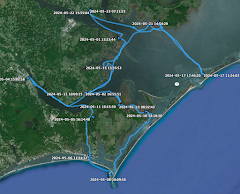
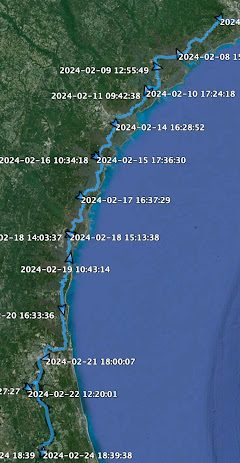

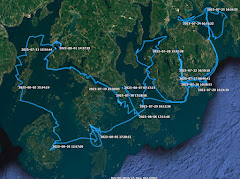

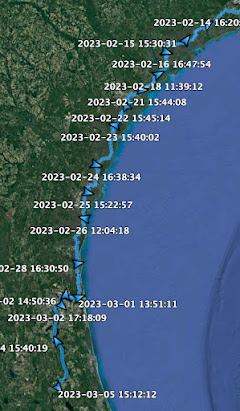

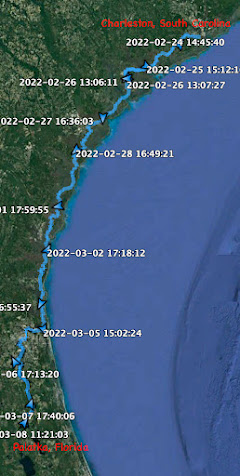
























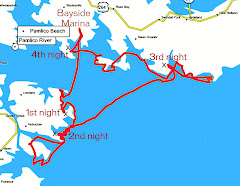


2 comments:
Steve, Thanks for posting your insights about small boat challenges in the area of Harlowe Canal, Beaufort, etc. I've enjoyed reading all your posts, been amazed at the photography, and found today's post a helpful contribution to all of us thinking about the NC Challenge (in September '09). I agree with all you said about the waterways. Studying tide tables and strategizing how to deal with tides and winds is certainly all too familiar to the WaterTribe's EC veterans. It's always all about the winds and tides.
--Paul
Steve, I checked my journal for the morning cruise down Taylor Creek. According to my notes our GPS indicated we were making between 6 to 7 knots. We figured the motor, at the RPMs we were turning, pushed us about 4 knots. We figured the current was between 2 and 3 knots. We were cooking along. After leaving Taylor Creek we cut the motor, hoisted the main and headed to Harkers Island. We were making 3 to 4 knots with sail alone. Our average speed from the mouth of Taylor Creek to Harkers Island Fishing Center was 3.4 knots.
Post a Comment